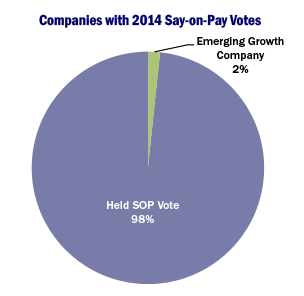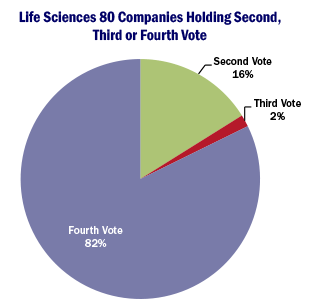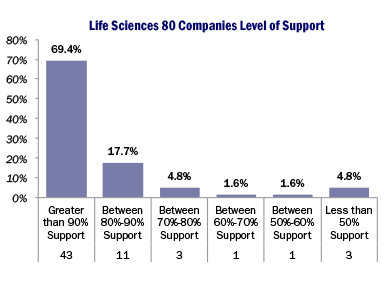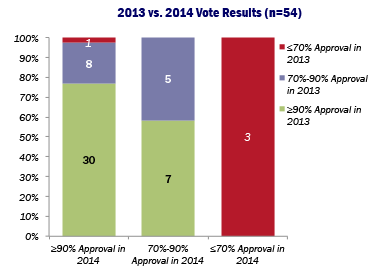“Say on Pay” at the Life Sciences 80 – A First Look at 2014
As the traditional annual meeting season drawing to a close, it’s time to take a look at this year’s results for the non-binding shareholder advisory vote on the compensation of a company’s named executive officers (the so-called “Say-on-Pay Vote”) required by the Dodd-Frank Wall Street Reform and Consumer Protection Act. 2014 was notable as the initial year for companies that opted in 2011 to hold their Say-on-Pay Vote on a triennial basis to conduct their first vote in the past three years.
As we have done since 2011, Compensia has been monitoring the Say-on-Pay Vote results for the most prominent companies in the life sciences sector (many of which are headquartered in the San Francisco Bay Area). We call this group the Life Sciences 80. (The companies comprising the Life Sciences 80 are listed on the Exhibit to this article.)
Four Things That Life Sciences Companies Should Know About the 2014 Say-on-Pay Votes
- This year’s results are shaping up to be consistent with prior year patterns. As in 2013, the vast majority of Life Sciences 80 companies have seen their shareholders overwhelmingly support the compensation of their named executive officers. To date, of the 62 life sciences companies that have held a Say-on-Pay vote, 95.2% have seen their shareholders approve the compensation of their named executive officers, while 4.8% have had their vote fail. Consistent with the patterns reflected in the Russell 3000, nearly 70% of the Life Sciences 80 companies that have held Say-on-Pay Votes to date have received more than 90% support. So far, only five Life Sciences 80 companies (8.0%) have received less than 70% support.
- The Level of Support in 2014 is Consistent with Prior Years’ Support Levels. The Life Sciences 80 companies that held their fourth Say-on-Pay Vote in 2014 have received average support of 89.0%, compared to 84.9% average support for the same group of companies in 2013, 89.8% average support in 2012, and 90.8% average support in 2011 – a decline of only 2.0% since the Say-on-Pay Vote requirement was enacted.
- The Say-on-Pay Vote for Each Year Stands on Its Own Merits. We continue to see dramatic fluctuations in the level of support for Say-on-Pay Votes from year-to-year. So far this year, three Life Sciences 80 companies that received more than 90% support in 2013 saw this support drop by at least 16% in 2014. Further, as has been the case since 2012, a successful vote in one year is no guarantee of the same result in the next year. Perhaps more interestingly, Life Sciences 80 companies that received less than 70% support for their Say-on-Pay vote in 2013 experienced mixed results in 2014 – two saw support for their executive compensation program increase significantly in 2014 – one by 20% and the other by 46%, while two others failed their 2014 Say-on-Pay Vote.
- Companies That Fail the Say-on-Pay Vote Have Had Difficulty Reversing this Result. Two Life Sciences 80 companies that failed their Say-on-Pay Vote in 2013 and have held their 2014 Annual Meeting of Shareholders failed the vote once again in 2014. In at least one of these instances, company responsiveness to stockholder feedback wasn’t sufficient to overcome unfavorable vote recommendations from the major proxy advisory firms.
This Thoughtful Pay Alert summarizes our findings as of June 30, 2014, based on the results of their 2014 annual meeting of shareholders as disclosed by the Life Sciences 80 companies. These results are reflected in the Exchange Act reports of these companies as filed with the Securities and Exchange Commission. We intend to update this report later this year to report our findings for annual meetings of shareholders conducted this fall.
For the Say-on-Pay results of companies in the technology sector, see our companion Thoughtful Pay Alert, “Say on Pay” at the Bay Area Tech 120 – A First Look at 2014.
Companies Reviewed
As of June 30, 2014, 63 of the companies in the Life Sciences 80 (79%) had held their 2014 annual meeting of shareholders and reported the results of the various votes conducted at the meeting. Of these companies, 62 conducted a Say-on-Pay Vote at the meeting. (The remaining company qualified as an “emerging growth company” as created under the Jumpstart Our Business Startups (“JOBS”) Act, which is not required to conduct a Say-on-Pay vote.)
Of the 62 companies that have held a Say-on-Pay Vote in 2014, 10 companies held their second shareholder advisory vote on executive pay (including eight companies – Bid-Rad Laboratories, Cell Therapeutics, Corcept Therapeutics, Cytokinetics, Omeros, Regeneron Pharmaceuticals, Sangamo BioSciences, and XOMA – that elected in 2011 to hold triennial votes) and one company (Horizon Pharma) held its third shareholder advisory vote. The remaining 51 companies held their fourth Say-on-Pay Vote. So far, no company has held its first Say-on-Pay vote in 2014.

2014 Say-on-Pay Results
Average Level of Support
Overall, the average level of support for the 62 Life Sciences 80 companies conducting Say-on-Pay Votes so far in 2014 has been 90.1%. In the case of the 51 companies which held their fourth Say-on-Pay Vote in 2014, average support was 89.0%, compared to 84.9% average support for the same group of companies in 2013, 89.8% average support in 2012, and 90.8% average support in 2011 – a virtually negligible decline of approximately 2.0% over the four-year period.

Support Among “Triennial” Companies
In the case of the eight companies which held their first “triennial” Say-on-Pay Vote in 2014, average support was 84.3%. This is slightly lower than the 91% support recorded by the Russell 3000 companies holding their initial triennial vote in 2014.
Actual Level of Support
The actual support for the 62 Life Sciences 80 companies conducting Say-on-Pay Votes so far in 2014 has been as follows:

While the decided majority of companies continue to receive strong support for the compensation of their named executive officers in 2014 – which is consistent with the pattern established in the Russell 3000, it is notable that 34 of these companies received more than 95% support from their shareholders, including 12 companies that received near unanimous approval of their executive compensation program with more than 99% of the votes cast on the Say-on-Pay proposal voted in favor of the proposal.
Unsuccessful Say-on-Pay Proposals
To date in 2014, three Life Sciences 80 companies, Cynosure, Dendreon, and OraSure Technologies, have failed to receive a majority of the votes cast in favor of their Say-on-Pay proposal.
At Cynosure, 47.2% of the votes cast supported the company’s named executive officer compensation, while 52.8% of the votes were cast against the proposal. This follows a vote of 67.0% for the proposal and 33.0% against the proposal in 2013 – a decrease of 19.8% of the votes cast on the Say-on-Pay vote.
In the case of Dendreon, 40.6% of the votes cast supported the company’s named executive officer compensation, while 59.4% of the votes were cast against (or abstained on) the proposal. This is the second consecutive year in which the company experienced a failed Say-on-Pay vote. In 2013, only 31.1% of the votes cast on the company’s Say-on-Pay proposal supported the compensation of its named executive officers. In spite of the company’s extensive stockholder outreach efforts following its 2013 Annual Meeting of Stockholders and resulting changes to its executive compensation program, these actions only boosted support for its executive compensation program by approximately 10%.
Finally, at OraSure Technologies, only 41.3% of the votes cast on the company’s Say-on-Pay proposal were voted in favor of the compensation of its named executive officers, with 58.7% of the votes cast on the proposal voted against their compensation. Like Dendreon, this was the second consecutive year in which the company failed its Say-on-Pay vote. In 2013, the company received 45.5% support for its named executive officer compensation. In both years, the company received unfavorable voting recommendations on its Say-on-Pay proposal from each of the major proxy advisory firms.
Year-Over-Year Vote Fluctuations
Of the 51 companies that have now held four votes, 28 received more support (an average of 6.4%, with a median increase of 2.7%) in 2014 compared to 2013, while 21 saw support for their executive compensation program decline (by an average of 5.9%, with a median decrease of 3.4%). Two companies (NxStage Medical and Theravance) received the same level of support for their executive compensation programs in 2013 and 2014.
As has been the case each year since 2012, several companies experienced a significant vote swing on their Say-on-Pay proposal between 2013 and 2014. So far, three companies have seen support for their executive compensation program decrease by approximately 20% between these years. In each instance, the company received an “against” recommendation on its Say-on-Pay proposal from ISS; most often because of a perceived misalignment of pay and performance.
Companies That Received Less Than Approximately 70% Support in 2013 Saw Mixed Results in 2014
Unlike in the technology sector, companies that received approximately 70% or less support in 2013 experienced mixed results in 2014. One company – Rigel Pharmaceuticals – that received only 53% support in 2013 saw a 46% increase in 2014, receiving approval from 99.2% of the votes cast on its Say-on-Pay proposal. A second company, Atricure, which received just over 71% support in 2013 saw support for its 2014 Say-on-Pay proposal increase by 20.0% to 91.2% this year. On the other hand, as described above, the two other companies that received less than 70% support in 2013 and have conducted their annual meetings to date both failed their Say-on-Pay Vote.
Companies that Received More Than 90% Support in 2013 Generally Stable in 2014
As in prior years, a number of the Life Sciences 80 companies (18) that received more than 90% support in 2013 saw support for their executive compensation program decline in 2014. The average amount of this decline (5.5%) was largely influenced by the fact that three companies experienced decreases of 15% or more.
In contrast, 16 of the Life Sciences 80 companies that received more than 90% support in 2013 actually saw this support increase in 2014 (by an average of 1.9%) – a noteworthy result given the limited amount of room to garner additional votes in favor of their executive compensation program. Further, of the companies that saw support for their Say-on-Pay proposal decrease in 2014, the decline for seven of these companies was 1% or less.

Final Observations
While the experience of the Life Sciences 80 companies with the Say-on-Pay Vote tracks that of the companies in the Russell 3000, consistent with the results of our other study for the Bay Area Tech 120 this vote has become largely a non-event for many companies, with support firmly lodged in the 90% range for each of the first four years of the requirement. Thus, as long as the company’s financial performance as measured by total shareholder return is in the top half of its industry sector, it is unlikely to face a real threat of a failed vote. Although the presence of a problematic compensation policy or program feature may alter this outcome, as a practical matter most major life sciences companies no longer have such a feature in their executive compensation program.
Need Assistance?
Compensia has extensive experience in helping companies draft the executive compensation disclosure in the proxy materials for their annual meetings of shareholders and analyze the potential impact on the Dodd-Frank Act shareholder advisory votes on their executive compensation programs. If you would like assistance in preparing your executive compensation disclosure for the required shareholder advisory vote on executive compensation, or if you have any questions on the subjects addressed in this Thoughtful Pay Alert, please feel free to contact Mark A. Borges.
Download pdf to read Exhibit: Life Sciences 80 – 2014 Shareholder Advisory Vote on Executive Compensation »
Download a pdf of this article »
